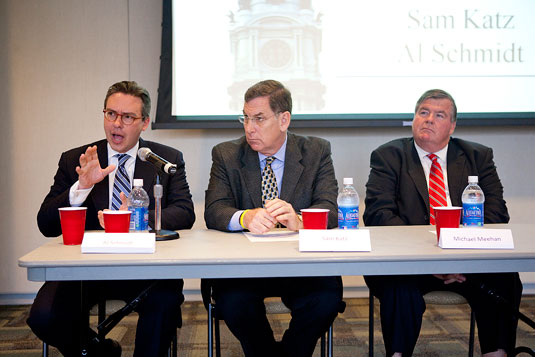Panel discusses challenges facing the future of Philadelphia’s GOP
 |
|
Photos by Kevin Cook
From left to right, Al Schmidt, Sam Katz, and Michael Meehan discuss oppurtunities and challenges facing Philadelphia's Republican City Committee in a panel discussion hosted by Temple's Institute for Public Affairs.
|
|
As political party leaders across the nation begin to prepare for general elections in November, leaders of Philadelphia’s Republican Party, students, elected officials, community members and professors recently met to discuss the future of the city’s Republican Party in a panel discussion organized by the Institute for Public Affairs at Temple University. In a city where Democrats outnumber Republicans by a margin of 6:1, a Republican has not been elected mayor in more than half a century, and until recently more than 60 percent of the party’s committee seats were vacant, this conversation was welcomed by party leaders who are seeking to increase membership to compete in future elections. Michael Meehan, counsel to the Republican City Committee and leader of the Philadelphia GOP, urged members of the audience to help Philadelphia by becoming “the party of ideas,” which could offer alternative solutions to some of the city’s major problems, like education, poverty, and crime. While the majority of the conversation centered on the Republican Party, political science doctoral candidate Nate Shrader, who helped organize and moderate the event, focused the conversation on identifying “the best way to renew a viable, active, two-party system that gives the people a choice.” What set this discussion apart from strategy meetings and forums across the country is that it wasn’t organized by Republican leaders; in fact, it was organized by a longtime political rival of many of the panelists – John Street. “I feel very strongly that students need to hear from people who have engaged in the political process, regardless of their viewpoint,” said Street, former Democratic mayor, city council member and now a teacher in Temple’s political science department who regularly hosts elected officials in his classroom. Street said he hoped the discussion would encourage students to engage in public service. Sam Katz, who faced Street in two elections for mayor of Philadelphia and has been a leader in Philadelphia’s GOP for decades, said part of the city party’s struggles are a result of the fact that “the national and state Republican parties are not seen as having an interest in the needs of urban communities.” He urged the audience to help get the message out that Philadelphia’s GOP is more moderate than the national party. Katz, Meehan, and Al Schmidt, who recently ran for city controller and also served on the panel, agreed that fresh voices and ideas are needed for Philadelphia’s Republican Committee to compete in elections. Members of the Republican City Committee and those seeking to hold elected office were on hand to answer student questions. |